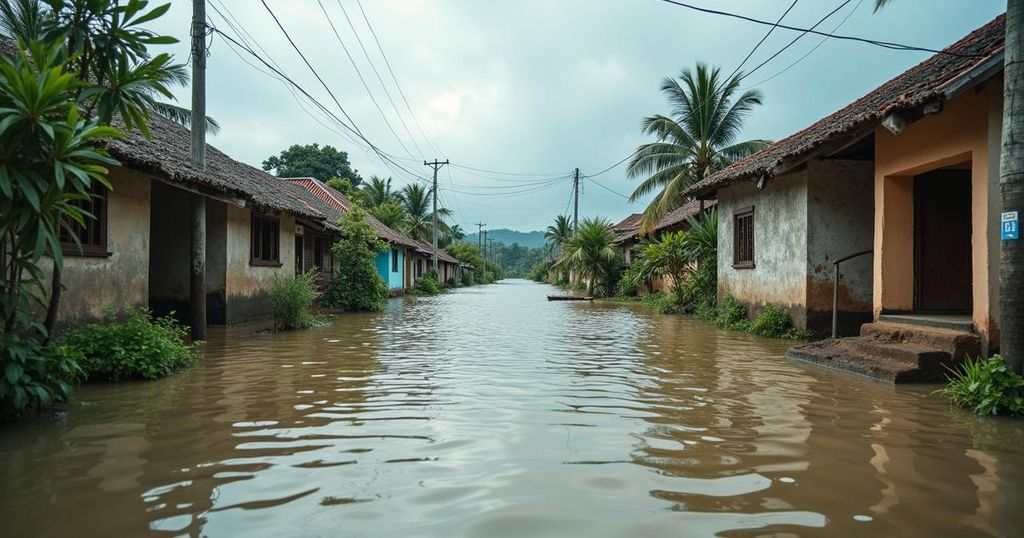West and Central Africa are experiencing devastating floods due to torrential rains, significantly impacting Maiduguri, Nigeria, where over 400,000 individuals are affected. The flooding has resulted in more than 1,000 fatalities across the region, overwhelming local infrastructure and humanitarian efforts. Survivors recount harrowing experiences, as international relief operations begin to address the mounting crisis.
Torrential rains have resulted in catastrophic flooding throughout West and Central Africa, escalating humanitarian crises in regions already beleaguered by conflict and poverty. In northeastern Nigeria, the devastating impact of the floods has affected over 400,000 people, as reported by the United Nations. Satellite images reveal extensive flooding that has displaced countless residents, inundating homes and infrastructure alike. Tragically, reports indicate that more than 1,000 fatalities have been attributed to the flooding across the affected countries, including Nigeria, Niger, Chad, and Mali, significantly exacerbating pre-existing humanitarian challenges. The city of Maiduguri, which has faced a long history of violence from Boko Haram militants, now grapples with the additional burden of flooding. Eyewitness accounts describe harrowing scenes, where the desperate cries for help could be heard as families struggled to flee the rising waters. Many older individuals and those with disabilities remained oblivious to the danger, resulting in a profound loss of life. Local authorities report over 600,000 displacements and numerous fatalities in Borno state alone, heightening the call for urgent international assistance as local resources are overwhelmed. The floods have wreaked havoc on vital infrastructure, leading to the escape of inmates from local prisons and the destruction of bridges and roads, rendering the city largely inaccessible. Amid ongoing rescue operations, survivors have recounted the heart-wrenching loss of family members and the destruction of their homes. Residents like Aishatu Ba’agana share stories of survival and loss, as she struggled to save her newborn amid the chaotic flooding. International relief efforts are under way; however, many individuals feel abandoned in their time of need, highlighting the inadequacies of state support. With forecasts predicting further rainfall, communities face an uncertain future, whether they remain in temporary shelters or attempt to rebuild their lives. Borno state Governor Babagana Zulum’s plea for assistance encapsulates the dire situation, emphasizing that local capabilities have reached a breaking point. Humanitarian agencies, including the World Food Program, have begun offering support to those displaced, yet challenges persist amidst the scale of devastation witnessed.
The article pertains to the severe flooding in West and Central Africa, particularly focusing on northeastern Nigeria where Maiduguri has been significantly affected. This flooding is a result of torrential rains that have been described as the worst in decades, resulting in thousands of fatalities and displacing numerous individuals. The region, already struggling with issues stemming from an ongoing insurgency by Boko Haram, faces compounded humanitarian crises exacerbated by extreme weather events. The United Nations has reported that over four million people have been affected this year, signaling an alarming increase compared to the previous year, which highlights the urgent need for international intervention to address both immediate and long-term recovery efforts.
In summary, the catastrophic floods in West and Central Africa have resulted in significant human suffering and displacement, particularly in Nigeria’s Maiduguri, where the local community faces dire challenges in seeking assistance and rebuilding from the devastation. The continuous rainfall poses further risks, placing additional strain on already vulnerable populations. Without adequate support, the cycle of humanitarian crises within this region could worsen, underscoring the need for coordinated international efforts to provide relief and address the underlying vulnerabilities exacerbated by climate change.
Original Source: apnews.com






